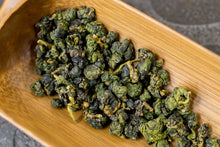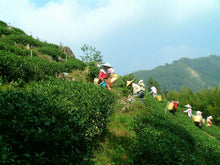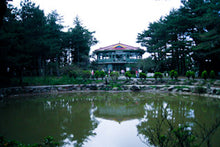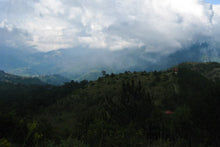Tian Chi means Heavenly pond. It is referring to the tea section of Li Shan which is grown around a small pond called Tian Chi that is located at 2580m. The Tian Chi Li Shan Cha is from the garden around that pond. The altitude of the garden is at around 2500-2700m. 

Tianchi Lishan Tea — Also Known as the “President’s Tea”
Have you ever tried the Lishan tea we offer?
Lishan tea is a lightly fermented oolong grown at 2,400 meters above sea level. It is characterized by a refreshing aroma—somewhere between flowers and citrus—that lingers in the throat, along with a sustained sweetness that leaves a pleasant aftertaste.
But there is an even higher grade of Lishan tea.
At 2,500 meters lies Tianchi (“Heavenly Pond”), beside which once stood the bungalow of the Taiwan Governor-General. During the era of Chiang Kai-shek, tea harvested in this region, known as Tianchi tea, was presented as tribute to the governor and became famous for it. Even today, Tianchi tea is regarded as one of Taiwan’s finest, highly sought after by government officials and tea connoisseurs. The Tianchi Lishan tea we carry at HOJO is harvested from tea gardens at an even higher elevation than Tianchi itself—a tea you will never forget once you taste it.
Because of its extremely high price, I hesitated to offer it for many years. However, in recent times, more and more customers have developed a refined palate for tea. And since Tianchi Lishan tea is one of my personal favorites, I finally decided to release it.
What makes this tea extraordinary is the remarkably strong throat sensation—it almost gives the illusion that the aroma is expanding all the way to the back of the throat. It contains exceptionally high levels of minerals, especially iron, far exceeding those found in other teas. This high mineral content gives the tea strong surface tension, so much so that when brewed, it can feel almost syrupy in texture.
The aroma slowly rises from deep within, lingering long after you’ve finished your sip. As for the taste, it delivers an intensely strong aftertaste, with a sweetness that stays in the throat for a long time.
In Chinese tea terminology, there is a phrase “hou yun” (喉韻), referring to the lingering sensation in the throat. Tianchi Lishan tea is truly the epitome of this concept.
And its excellence doesn’t stop at flavor. Because it is so rich in concentrated compounds, it can easily be brewed up to eight times. If you hold the leaves in your hand, you will get a sense of their quality—the leaves, harvested at one bud and three to four leaves, are surprisingly soft, clinging to your hand like thin, pliable rubber.


The “Tianchi” that gives this tea its name.

The scenery around the Tianchi tea gardens—unmistakably a high-mountain climate
There is another way to enjoy this tea.
If you store it at room temperature in this state for six months to a year, the tea will naturally develop a peach aroma. As we prefer to introduce the tea in its fresh state, we currently do not sell aged tea. However, trying the aging process at home can be a delightful experience. The peach fragrance that develops is exceptionally strong—so much so that it hardly seems like tea at all.
Furthermore, the used tea leaves after brewing are far too valuable to simply throw away. In fact, there is a wonderful way to reuse them.
Add the brewed tea leaves to miso soup, other soups, or simmered dishes, let them boil for 30 seconds to 1 minute, and then remove them. This is similar to making broth with bonito or kombu. By doing so, the flavor of the dish improves dramatically. Even without adding broth, it tastes as though a premium stock has been used—rich, deep, and delicious. This is because the minerals in the tea leaves dissolve into the soup.
Another application is to add the brewed tea leaves when cooking rice. Thanks to the minerals, the flavor of the rice becomes exceptionally tasty.

When it comes to discussions about the finest Taiwanese teas, the conversation inevitably turns to award-winning Dong Ding Oolong or Alishan teas from competitions.
Of course, these teas are undeniably excellent. However, the Alishan tea competitions are judged within the category of Alishan teas, and Dong Ding Oolong competitions are judged within the category of Dong Ding Oolongs.
In reality, when comparing the finest Alishan tea with Lishan tea, it is unfair to compare Alishan tea harvested at 1,500–1,600 meters with Lishan tea harvested at 2,400 meters. The growing environments are vastly different, resulting in fundamental differences in the character of the tea and the intensity of its throat sensation.








